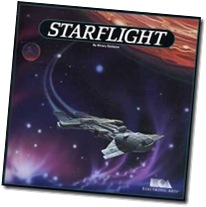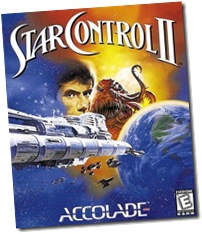 Yesterday I mused about roleplaying in the SF genre and in the evening I remembered some of the computer games I enjoyed tremendously in my youth: the Starflight series and Star Control 2. Both game series featured space exploration, mining, tongue-in-cheek humor, space combat and a huge galaxy to explore. Starflight 1 for example had about 250 stars with over 800 planets. And aside from high-G planets or gas giants you could explore all of these planets, mine raw materials and explore ruins left by the Old Empire and the Ancients.
Yesterday I mused about roleplaying in the SF genre and in the evening I remembered some of the computer games I enjoyed tremendously in my youth: the Starflight series and Star Control 2. Both game series featured space exploration, mining, tongue-in-cheek humor, space combat and a huge galaxy to explore. Starflight 1 for example had about 250 stars with over 800 planets. And aside from high-G planets or gas giants you could explore all of these planets, mine raw materials and explore ruins left by the Old Empire and the Ancients.
In both game series you commanded a modular spaceship that you could customize and upgrade to a certain extent and Starflight had a few classic roleplaying elements when it comes to creating your crew. Each ship officer had several skills like Navigation, Science and Engineering and could be from one of the races living on Arth, your homeplanet.
 The question is now: how can we take both games as an inspiration for a pen & paper RPG campaign? What I like a lot is the focus of exploration in both series. There’s a vast galaxy out there and the players are boldly going where noone has gone before. Because there is no FTL communication, a starship is mostly on it’s own. There’s probably an overall mission but what the players do is mostly there own decision, there are no Admirals holding their hands all the time. So in a way the crew of such a spaceship is a lot like the classic adventuring party.
The question is now: how can we take both games as an inspiration for a pen & paper RPG campaign? What I like a lot is the focus of exploration in both series. There’s a vast galaxy out there and the players are boldly going where noone has gone before. Because there is no FTL communication, a starship is mostly on it’s own. There’s probably an overall mission but what the players do is mostly there own decision, there are no Admirals holding their hands all the time. So in a way the crew of such a spaceship is a lot like the classic adventuring party.
A campaign inspired by Starflight/StarControl is probably best run like a slightly modified sandbox game. The players decide what route they want to take, but everything is given some direction by an overall mission. This may be finding a new home for humanity, fighting against a terrible foe, learning more about a now extinct precursor race, or whatever else might motivate your players.
The next step will be coming up with a setting that works a basis for such a campaign. I already have a couple of ideas that I might share with you in the upcoming weeks, but if you have any ideas of your own, feel free to share them in the comments below!

A word of warning about starship combat: unless you manage to find a narrative and integrative way to do it (in which case I would very much like to hear about that), it can be a very complicated, boring thing to manage (think “Car Wars in space”, but with only one or two players playing)…
Thanks for the warning, but I have already put some thought into this. Space combat will probably not play a major role and if there’s space combat I’ll make sure that every character has a job on the ship. That’s how we did it in Star Wars, too. If you’re not the pilot you could at least control one of the guns or do some repair.
Good idea! I know several games (mostly French ones) that have a similar system.
Having a system of dwindling resources would add to the feel of self reliance for this kind of game. Also allowing some of those resources to be converted from one form to another at a cost would help out if the planet the players just visited didn’t have any, say water or uranium and they’re out.
In this setting the players wouldn’t want to be miners so a group of robots that go down and do the dirty work would be a good idea but also opens up the possibility of the robots flagging interesting things they encounter for the crew to investigate or the crew having to solve logic puzzles when the robots hit a snag in their normal operation (native aliens getting in the way?).
That’s actually a great idea!
Great, now I want to play Star Control 2 again. And I want to run a space exploration RPG. Thank you very much for making me waste my time! 😉
Cheers, Marcus
I know that starship fights can be boring if some players have nothing to do.
Short Idea to do the starship combat quick and easy:
A List from 1=Startship destroyed to 20=Victory and the opponents are destroyed. The PCs starts at 1. The PC have now the chance to push the value with skill rolls up.
Everybody have something to do and it is very quick.
There’s another inspiration for this type of campaign:
Star Trek (TOS or TNG)
And, by having a directed authority like that (Star Fleet), it can be a little more scripted. Instead of them randomly hopping off in whatever direction they want to go (making it harder for you to have a stock of ready planets, or having to use a planet generator on the fly), they have a sort of set order of stars they’re to go explore. And you can set those up in advance in a way that makes sense, without having it be artificially forced (ie. “you can go to whatever star system you want, but the next star system you visit will have this pre-generated set of things”).
It also makes it less likely that they’ll cherry pick (drop into star system A, which you’ve prepared … and then they leave without even investigating, because it doesn’t look as fun; and off they go to star system B, which you may or may not have prepared … and then they quickly leave again after you’ve done a quick randomized star system generation). They’ve got orders to investigate the next star system, so that’s what they’ve got to do.
It makes it sort of like a hybrid between a sandbox and linear campaign. And because they’re exploring out on the frontier, beyond the immediate communication with their fleet command, they still have a relative degree of autonomy.
Btw: if they have FTL drives, they have some amount of FTL communication: message torpedoes that fly back to a known location at FTL speed, drop the message, and then fly back to the ship either at the same location or at a per-arranged location. Still not instant conversation, and can even be sort of like a “mail drop” for everyone on the ship (the torpedo sends a ton of emails from the crew to the fleet and/or family, and receives any pending emails for the crew from fleet and/or family)… but it’s still not waiting 10 years for a message from the next star system over 😉
I too really like the Dirty Work Robots idea. I’ve not heard of this being used for quite this purpose in a game before. It feels quite elegant in how it abstracts most of the drudgery of this premise away from the foreground in a way that makes sense from an in game perspective. It also can be used as a plot driver which is an added bonus for sure.
The other consideration for this game that I would suggest is that you define a reason for why they are exploring and why they don’t have direct supervision. One obvious setup would be they are independent prospectors, searching for valuable commodities to bring back to the homeworld(s). This could drift into a Firefly motif however, where the economics of keeping the ship flying are paramount over the pure thrill of exploration.
Your game concept doesn’t appear to be focusing on the struggle of exploring the galaxy, more like the wonder of exploring the galaxy. Instead of being independents, the PCs are members of a government or military funded scout team. Perhaps there are numerous such scout teams, all sent out to find & discover. The risks are high, the likelihood of success low, and let’s make it such that both ships and crew are cheap. I propose a scenario where there are a finite number of habitable worlds. All the inhabited worlds are grossly overcrowded and the biggest need of all is new worlds to colonize. There are plenty of people to send out. The non-habitable worlds within reach provide plenty of resources to build more ships and possibly even orbital colony structures, but the orbitals are only “band-aid” solutions. The real need is full sized planets where vast numbers of people can be sent to relieve the existing population pressures.
So scout teams are outfitted with cheap, mass-produced ships. They are of a simple, modular design to allow for easy production as well as easy maintenance and repair. Teams leave for the stars, hoping the system they reach will have a new colony world to settle. Almost always this is not the case, 99% of systems are non-viable, but the teams keep being sent out.
Despite the fact that most teams are never heard from again, there are always more applicants than crew positions. The government literally can’t make ships fast enough. Why are people so eager? Picture this choice: ship out with a handful of people on a roomy exploration ship with low survival rate, but a small chance that you’ll become heroes for your entire culture, or stay home with far, FAR too many people all the time. Imagine how crowded Earth would be with, say, 70 Billion people? Some people will do ANYTHING to not go past 5 million people on their one mile trip to work… 🙂
If the players & PCs approach exploration from this mindset, they will be able to really get into the sense of freedom and wonder their missions provide. Even a lifeless system with an asteroid field drifting around a burned out cinder of a sun is better than home! LOL!
I firmly believe that playing Star Control 2 is absolutely necessary to gain an appreciation for “Humans gathering alien allies against the bad guys” thing way before Mass Effect did.